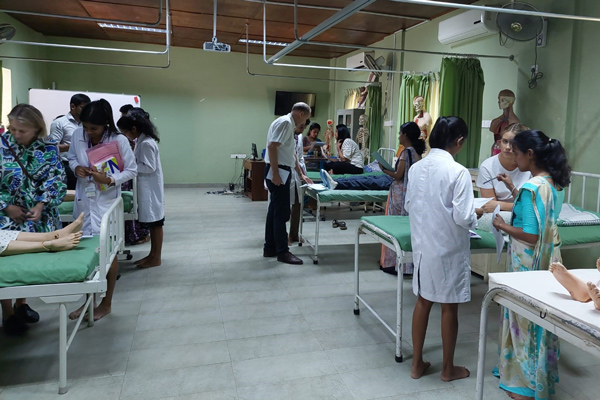
Student pharmacists learning through a mock ward exercise.
In 2009, Professor Ian Coombes, RBWH Director of Pharmacy and Dr Judith Coombes, Senior Pharmacist at Princess Alexandra Hospital, along with their three children aged between eight and 12 years-old, packed up their lives in Brisbane and moved to Kandy, Sri Lanka for three months.
“If you’re going to do it, you might as well go all in. Otherwise you run the risk of it being just volunteer tourism,” Ian said.
While Ian had always had a desire to make a contribution through his work in other parts of the world, he wasn’t quite expecting to begin by teaching an entire university subject in a Sri Lankan public university.
“At first, we had discussed doing a few guest lectures however, before we knew it, they had cancelled all the other lectures for eight to 10 weeks and we were to teach the whole course,” Ian said.
Since that first trip, Ian and Judith have returned to Sri Lanka almost yearly, creating meaningful alliances with public universities and hospitals, along with building support and gaining funding for their work back home.
Fourteen years later, Ian is one of the directors of the Collaboration of Australians and Sri Lankans for Pharmacy Practice, Education and Research, otherwise known as CASPPER.
“Previously, pharmacists in Sri Lanka have had a limited role, namely dispensing drugs, and many people who graduated from pharmacy would end up in the pharmaceutical industry or leaving the country to pursue non-clinical PhDs abroad,” Ian said.
“What we have done is show the value of including pharmacists in medical teams to improve health care, such as diabetes, renal and blood pressure management, and essentially help patients with taking their medicines and stay out of hospital.”
On Ian’s latest trip to Sri Lanka in August this year, he was joined by seven other pharmacists, including Paul Firman RBWH Assistant Director of Pharmacy Cancer Care, Hannah Knowles RBWH Senior Pharmacist Emergency and Trauma Centre, two pharmacists from Princess Alexandra Hospital, one pharmacist from Melbourne and two from the UK.
The group lent their expertise through a three-week Train the Trainer program at the University of Sri Jayewardenepura in the country’s capital, running mock wards and leading practical training in hospitals for a range of academics and hospital pharmacists. Alongside this, at the University of Peradeniya, near Kandy, they ran a practical training program for undergraduate pharmacy students.
“What we do is put them into practical contexts,” Ian said, “it is extremely hard to get into university in Sri Lanka, so these people are the smart of the smart – they have incredible knowledge – we help them apply this knowledge in patient-centred ways.”
The impact of their work in Sri Lanka is immediate and lasting.
“Within days we can see the transformation of these pharmacists, going from a desire to provide patients with too much information, to being patient and problem-centred in their approach,” Ian said.
On their most recent trip, of the 29 undergraduate students the CASSPER team worked with, 24 came away saying they wanted to work in a hospital in a patient-facing role, as they could see firsthand the value of hospital pharmacists in patient care.
In Sri Lanka, pharmacists face a number of challenges, from civil unrest to limited resources and significant medicine shortages, making them well-versed in dealing with uncertainty.
“We have so much in Australia, but we will always say that it is never enough,” Ian said, “we can run so many tests here, in Sri Lanka we see the clinicians have very high clinical acumen because you can’t test or scan everything and they have limited access to medicines.”
Along with the challenges of the Sri Lankan health care system, the group have also encountered inter-cultural differences in their approach to work, particularly in the way in Sri Lanka’s hospitals remain very hierarchical.
“As part of the Train the Trainer program, we teach senior academics to give and use feedback as a positive teaching tool to reinforce positive behaviour and correct mistakes,” Ian said.
“Culturally this is quite complicated, as they are not used to giving feedback to people in senior positions, however, cultural differences melt away when you place patient care at the centre of what you do.”
“Your role as a health care professional is not to complete a task, but rather to improve patient care. The role of a pharmacist is to advocate for patients, improve safety and inform patients about their medications — this is really a cultural leveller for all of us.”
Ian and his colleagues’ impact in Sri Lanka has grown over the years, and more recently he has been involved in working with stakeholders to influence the local government about embedding pharmacists in health care teams, rather than just having pharmacists dispensing medications.
“To make a real impact it’s a long game. It requires continuing input over years, and you have to win trust, build relationships, develop a track record and earn the respect of the people there,” Ian said.
By working with pharmacists in Sri Lanka to have a more patient-centred approach, Ian’s work through CASPPER has had a “ripple effect” and other pharmacists in the country can now see the role and value they can provide in patient care.
“Never underestimate the power of a group of well intended volunteers,” Ian said.
Ian encourages other health care workers to share their skills in a country where their impact would be greatly felt. “In Sri Lanka, they would love more support from physiotherapists, nurses, microbiologists, pathology scientists as well as medical staff,” Ian said.
“If you have the opportunity to go as part of your professional development, I highly recommend it. It is absolutely hands down the most satisfying thing that I’ve done in my working life.”
For more information about CASPPER, visit their website, Facebook or Instagram.